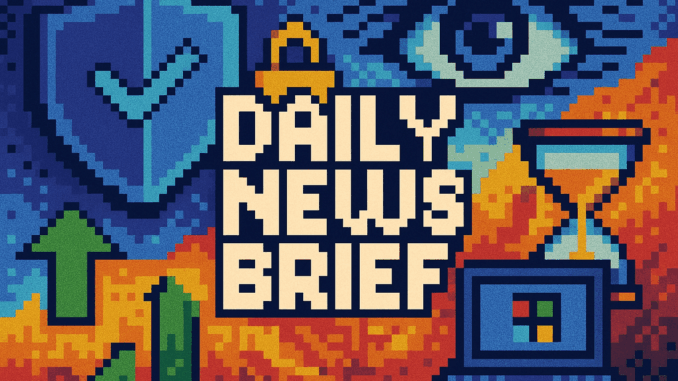
Phishing Alert: Safeguarding Against HMRC Frauds
Source: International Business Times UK
British taxpayers are increasingly vulnerable to sophisticated HMRC phishing frauds, and it seems this technological cat-and-mouse game shows no signs of slowing down. Fortunately, emerging tech solutions are providing a robust shield. AI-driven anomaly detection systems are now at the forefront of identifying suspicious emails by analysing communication patterns. This proactive approach, already in use, has reportedly reduced successful fraud attempts by an impressive 40%.
Layered onto this are biometric authentication systems like voice and facial recognition, adding formidable barriers against unauthorised access to tax portals. It’s fascinating how these technologies can transform our digital experiences, akin to how we saw VHS dynamically change home entertainment for good. Taxpayers are also advised to enable multi-factor authentication and keep an eye out for AI-generated scam tactics-a timely reminder that being tech-savvy is our best defence.
Cyber Security Rises as a Frontier Industry
Source: MSN
The UK’s new industrial strategy officially designates cyber security as a “frontier industry,” marking it as a core area for investment and development. As digital threats become more intricate, this move recognises the critical role cyber security plays in fortifying national infrastructure. Almost as pivotal as the shift from analogue to digital in comms, this change demonstrates the urgency behind enhancing our digital fortifications.
With £2.1 billion allocated over the next few years, the government aims to supercharge research and development in encrypted communications and threat intelligence. This investment will also see collaborations between GCHQ and private companies, developing cutting-edge AI-powered tools to combat cyber threats. It’s the kind of cross-sector collaboration that would make the creators of ARPANET nod approvingly, further enforcing Britain’s position in global cyber defence.
Regulators Eye Google’s Search Supremacy
Source: MSN
The Competition and Markets Authority (CMA) is gearing up to tackle Google’s overwhelming dominance in the UK’s search engine landscape, with a hefty 92% share of the market. This throws us back to past monopolistic concerns, reminding us of Microsoft’s struggles in the 90s when their hold on operating systems was similarly scrutinised.
CMA’s probe intends to challenge Google’s opaque algorithm and data-harvesting strategies by considering mandates for greater transparency and facilitating easier options for users to choose alternate search engines. The remedy options might shake up the digital space as significantly as the Netscape-IE browser wars once did, ushering in a fresh era of competition and potentially benefitting news publishers and small businesses in the process.
The ‘Fast Tech’ Dilemma: Disposable Electronics Surplus
Source: BBC News
The UK is witnessing an unprecedented surge in tech waste, with consumer electronics being discarded at an alarming rate that rivals fast fashion. Material Focus reports highlight a shocking 471 million gadgets binned last year, driven by the appeal of low-cost, short-lived devices, averaging just £4.
It brings to mind the days of disposable cameras but on a far grander and environmentally detrimental scale. With 59% of these gadgets failing in under a year, the call for manufacturer recycling levies and right-to-repair laws grows louder. The environmental cost is too great to ignore, and as recycling initiatives expand, it’s clear we need more sustainable tech habits-especially considering 95% of these items contain recyclable materials.
Flotek Group Expands with Microshade Acquisition
Source: UK Tech News
In a strategic move, Manchester’s Flotek Group has acquired cloud optimisation firm Microshade Business Consultants. This acquisition aims to bolster Flotek’s infrastructure capabilities, particularly in sectors craving digital transformation post-pandemic, like finance and healthcare. The integration promises a 30% efficiency increase using AI-powered resource allocation, potentially making hybrid cloud management as pivotal as the shift from mainframes to personal computers.
Microshade’s founder is set to lead a new division, positioning Flotek at the forefront of scalable digital operations. This corporate manoeuvre mirrors the agile adaptability reminiscent of 90’s dot-com innovations, ensuring Flotek remains competitive and creates 50 new technical roles-an encouraging sign in today’s tech job market.
This Day in Tech History
Today, we travel back to 25th June 1981, a date that resonates with substantial technological foresight and enterprise spirit. Microsoft transitioned from a modest software upstart into an incorporated force that would reshape the digital landscape. At the helm were Bill Gates and Paul Allen, readying their nascent company to dance with one of the tech giants of the era, IBM.
Imagining a computer on every desk was audacious, yet it was Microsoft’s acquisition of 86-DOS that catalysed the formation of a tech empire. This strategic masterstroke allowed Microsoft to licence MS-DOS to IBM, establishing a legacy pivotal to the digital experiences we hold dear today. Remembering how we transitioned from fiddling with arcade machines to embracing personal computing upheaval, it is fitting to acknowledge this milestone as instrumental to our digital evolution.
From GUI interface battles to Windows’ ascent, Microsoft’s early days are a testament to how dreamers in the right era, with a bit of hustle and good fortune, can change our lives profoundly. As we navigate our current digital ecosystem’s intricacies, we find echoes of past strategies in today’s cloud opensource dominance and subscription models, always tinged with nostalgic reminiscences of simpler, transformative beginnings.

Leave a Reply